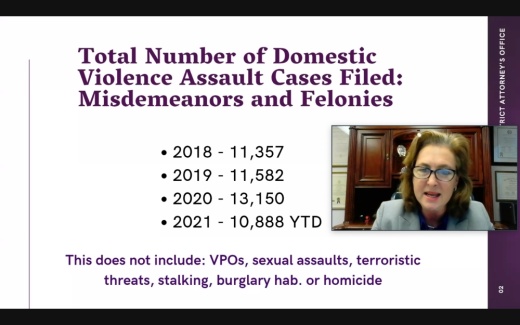To help better handle these case numbers, which do not include protective orders, sexual assaults, terroristic threats, stalking or homicides, Harris County District Attorney Kim Ogg will be looking for more funding and more employees for the office’s Domestic Violence Division from Harris County Commissioner’s Court in fiscal year 2022-23.
“We are looking to invest more in our community to stop domestic violence,” Ogg said during an Oct. 27 web panel on domestic violence. “So not only am I willing to advocate for support for you, I am willing to invest in you because this is the people's money. I wanted to go back to the communities that have been hurt by the very criminals who we forfeit the proceeds of their crimes.”
During the panel, Ogg was joined by members of her office’s Domestic Violence Division, who spoke on several points about the work it is performing to help combat domestic violence, including assistance with reporting and prosecution, safety measures victims can take through criminal courts, and the work that is performed by the division’s social workers.
“The state of criminal justice when it comes to domestic violence and, in truth, overall in Harris County, is in crisis,” Ogg said. “The good news is the system is not broken. You’ll hear a lot of people in the political world, the social media world and to some degree our victims feel like our system is broken. I assure you it’s not.”
For example, according to data from the DA’s office, there were 83 victims of domestic violence homicide in 2020. In total, Harris County, including the city of Houston, saw 389 charges/cases of murder in 2020, up from 276 charges/cases in 2019, according to a study by the Harris County Justice Administration Department.
Domestic violence homicide has been one of three drivers for the county’s increasing homicide rate, Ogg said. The other two are: commission of murders by repeat violent offenders and a commission of murders by gang members.
“In the four and a half years I have been in office, this is the most that we’ve ever filed in this area,” Ogg said on the number of victims of domestic violence homicide.
That is why the Domestic Violence Division is imploring victims of domestic violence to call the police and get law enforcement involved, and to make sure they are keeping close friends and family in the loop so that if things escalate, they have people they know and are on alert for any kind of concerning situation, said Michael Hanover, the Domestic Violence Division’s assistant district attorney.
However, even in cases with an uncooperative victim, the DA’s office is still able to prosecute through other evidence, including 911 calls and body camera footage, photographs taken by law enforcement at a crime scene, and talking to friends and family of the victim, Hanover said.
A protective order also remains an option for victims of family, domestic or dating violence, and victims of stalking, harassment, sexual assault, and more, Assistant District Attorney Cornelia Hartman said.
From the time the application for a protective order is received to the time the case goes to court is about 60 days, though victims can be granted an ex parte protective order—good for 20 days that can be extended—in the interim if a judge feels there is a clear and present danger of family or dating violence, Hartman said.





